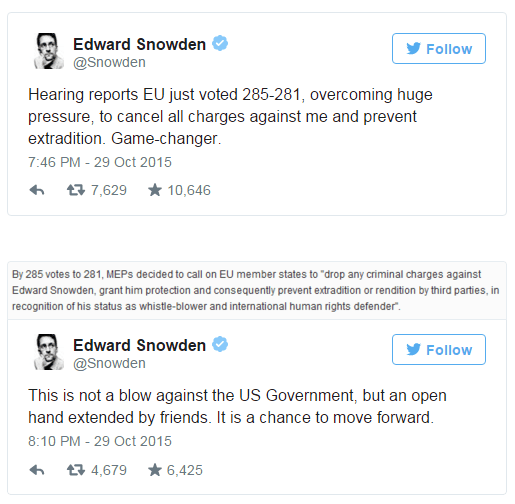The European Parliament has voted in favour of a resolution that calls on all EU member states to “drop any criminal charges against Edward Snowden, grant him protection and consequently prevent extradition or rendition by third parties”.
Mr. Snowden, who was described by the parliament as an “international human rights defender”, described the announcement as a “game-changer” on Twitter. He added that this “is not a blow against the US government, but an open hand extended by friends”.
While still clearly a divisive issue – the motion was only narrowly passed by 285-281 votes – the ruling in support of the former National Security Agency (NSA) contractor is a huge blow to officials in the US, where he remains a wanted man (for the theft of government property).
Mr. Snowden is currently living in exile in an undisclosed location in Russia. He arrived there in June 2013 via Hong Kong, having fled to the city after leaking details of secret mass surveillance by US intelligence agencies to the Guardian and the Washington Post.
Originally granted asylum for 12 months in 2013, he was subsequently offered a three year residency in the country when his 12-month sojourn expired. This deal also allows him a certain level of freedom to travel abroad.
The White House, unsurprisingly, was critical of the decision, with Ned Price, spokesperson and senior director of the National Security Council, stating unequivocally that it’s position on the matter “has not changed”.
“MR. SNOWDEN IS ACCUSED OF LEAKING CLASSIFIED INFORMATION AND FACES FELONY CHARGES IN THE US. HE SHOULD BE RETURNED AS SOON AS POSSIBLE, WHERE HE WILL BE ACCORDED FULL DUE PROCESS.”
He said: “Mr. Snowden is accused of leaking classified information and faces felony charges here in the United States. As such, he should be returned to the US as soon as possible, where he will be accorded full due process.”
In addition to announcing the new approach to Mr. Snowden, the European Parliament also criticized Europe’s poor response to safeguarding their citizens’ fundamental rights “following revelations of electronic mass surveillance”.
It also expressed concern over recent laws passed by some member states, particularly in the UK, France and the Netherlands, that “extends the surveillance capabilities of intelligence bodies”.
Source: welivesecurity.com

He is a well-known expert in mobile security and malware analysis. He studied Computer Science at NYU and started working as a cyber security analyst in 2003. He is actively working as an anti-malware expert. He also worked for security companies like Kaspersky Lab. His everyday job includes researching about new malware and cyber security incidents. Also he has deep level of knowledge in mobile security and mobile vulnerabilities.













